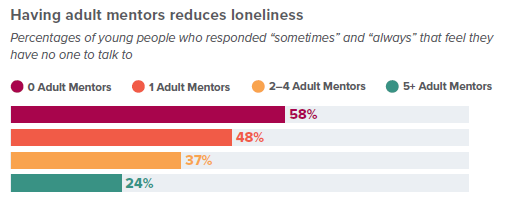Gen Z is getting lonelier, but faith leaders can make a difference

Kevin Singer and Josh Packard
What do obesity, smoking 15 cigarettes per day, and loneliness have in common? They are equally draining on one’s life expectancy.
Loneliness is especially evident for members of Gen Z, or those born between 1995-2010. Springtide Research Institute, which surveys Gen Z by the tens of thousands, recently found that 70% of young people between the ages of 13-25 experience three or fewer meaningful interactions per day, while 40% say they feel they have no one to talk to and that no one really knows them well.
Despite these startling numbers, there may be a cure for the pain. Springtide found that mentoring relationships with older adults—including faith leaders—make a substantial difference.
Springtide’s 2020 study of over 10,000 young people found that as the number of trusted adults in a young person’s life increases, the level of loneliness and purposelessness they feel decreases. While 24% of those with no adult mentors say they never feel their life has meaning and purpose, with just one adult mentor, this number dropped to 6%. A similar trend held true for loneliness—while 58% of those with no adult mentors say they sometimes or always have no one to talk to, this number dropped to 48% with just one adult mentor.

There is one problem: meaningful exchanges with older adults, or with anyone for that matter, is not Gen Z’s forte. Nearly 70% of young people ages 13–25 report having three or fewer meaningful interactions per day. More than one in four young people say they have one or fewer adults in their lives they can turn to if they need to talk. Few of these adults are leaders in their churches, mosques, or temples: Just 8% of young people say there is a religious leader they can turn to if needed.
Some might be surprised to find that Gen Z is struggling socially. After all, don’t they have unprecedented access to the world through their smart phones, social media, and other digital tools?
Studies have shown that these devices actually have a negative impact on their feelings of social connection. One study found that students with smartphones experience higher levels of isolation, loneliness, depression, and anxiety. Despite big tech’s best intentions, face-to-face social interaction simply cannot be replaced by digital interactions.
Yet apparently, isolation also leads to increased spiritual curiosity for young people. Springtide found that during the early months of the COVID-19 pandemic, as shutdowns and social distancing began, 47% of young people said they grew in their faith compared to just 11% who doubted their faith more and 7% who lost their faith altogether. Furthermore, 46% told Springtide they started new religious and spiritual practices, compared to just 26% who said they stopped a religious or spiritual practice during the opening months of the pandemic.
Gen Z sometimes gets a bad rap for being “unchurched” or spiritually aimless. Our data suggests that an attitude like this risks missing a huge opportunity to influence a generation that is showing remarkable resilience in their faith.
This couldn’t be more true than right now. Just 1% told Springtide that a faith leader reached out to check in with them as pandemic shutdowns began. Imagine 100 young people sitting in a lecture hall or in the stands at a football game—or in this case, stuck at home unable to see teachers, classmates, and friends. According to our data, just one of these young people would say a faith leader reached out to check in as they navigated this perplexing new reality.
To be sure, young people shouldn’t be approached willy-nilly about deep questions, including spiritual ones. Our study found that Gen Z is eager for relationships with trusted adults that exhibit “relational authority”—an approach that pairs expertise with qualities like integrity, transparency, vulnerability, and genuine care. Traditionally, religious leaders have relied upon their institutional authority to influence people, whether it be their title, their years of experience, or a ministry network. Our findings suggest that while young people are interested in expertise, they are far more pliable when they sense that an adult genuinely listens, is honest about their own experiences, and makes an effort to be relatable.
One word of encouragement: If it can be safely done, faith leaders should try to connect with young people outside of Zoom and other virtual environments. Though virtual environments have quickly become the status quo during the COVID-19 pandemic, over 60% of young people told Springtide they feel disconnected from people in virtual environments, while 57% say they don’t feel they can ask questions of authority figures in virtual environments.
Perhaps it’s cliché, but to understand the lives of young people right now, Justin Bieber is instructive. His two most popular songs released during the pandemic were titled “Lonely” and “Holy.” Right now, faith leaders should be asking how they can address the former and encourage their pursuit of the latter.
BIO
Kevin Singer is Head of Media and Public Relations for Springtide Research Institute, professor of religious studies at two community colleges, and Co-Director of Neighborly Faith.
Dr. Josh Packard (@drjoshpackard) is Executive Director of Springtide Research Institute.



